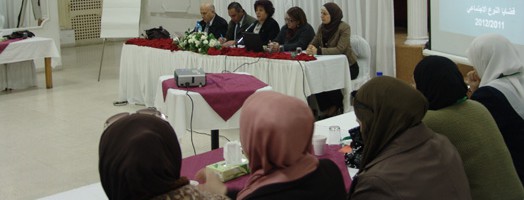Integrating Gender Criteria in the Work of Local Government Units in Nablus and Salfit Governorates
Nablus: Sunday, 8 January 2012 – In cooperation with the Ministry of Local Government (MoLG), the Institute of Law (IoL) at Birzeit University launched a specialised training course on Integrating Gender Criteria in the Work of Local Government Units. The training event targets staff members of local government units (LGUs) in the governorates of Nablus and Salfit.
As part of the Millennium Development Goal (MDG) on Promoting Gender Equality and Empowering Women in the occupied Palestinian territory, six UN Agencies, namely UNDP/PAPP, UN-Women, ILO, UNESCO, UNFPA and UNRWA, are implementing a Joint Programme funded by the Government of Spain on Gender Equality and Women's Empowerment, covering the period 2009-2012. The Program aims to achieve three major Outcomes:
1. Reducing gender based violence and all form of violence against women and the girl child;
2. Increasing the representation of women’s and women’s issues in decision making bodies;
3. Advancing equal opportunities for women’s economic participation, especially women survivors of gender based violence.
With reference to output 1.3 “Capacity to provide refuge, security, and access to justice strengthened” and output 2.2, “Organize training and workshops to raise awareness on gender in local authorities and related NGOs”, UNDP seeks to:
1. Develop specialised curricula and training material and conduct training for judges, lawyers and prosecutors on gender issues and the provision of assistance to victims of violence and gender based violence.
2. Provide gender awareness training to local government staff in 15 districts to develop their capacity on mainstreaming gender in district development planning and service provision.
Advocate Samar Abdu Bali, Project Legal Assistant, inaugurated the training course. In her opening remarks, Advocate Bali explained that the IoL pays special attention to enhancing the justice and local government sectors. In this context, the IoL works towards integrating gender issues within the work of judges, lawyers, prosecutors, and LGU staff. Targeting a better public service delivery, the IoL seeks to incorporate gender criteria within concepts of planning and local development initiatives. In addition to building and promoting capacities of LGU staff, all forms of gender-based discrimination will be eliminated.
In the opening ceremony, Engineer ‘Adli Ya’ish, Chairman of Nablus Municipality, highlighted relevance of gender issues to LGUs throughout the Nablus governorate. To achieve real development, Ya’ish stated that social justice should be maintained throughout the society. A real progress cannot be maintained so long as women are subject to inequity. In fact, women play an effective and efficient role in the society.
In the opening ceremony, Engineer ‘Adli Ya’ish, Chairman of Nablus Municipality, highlighted relevance of gender issues to LGUs throughout the Nablus governorate. To achieve real development, Ya’ish stated that social justice should be maintained throughout the society. A real progress cannot be maintained so long as women are subject to inequity. In fact, women play an effective and efficient role in the society.
Mr. Khaled Ishtayyeh, Director General of the MoLG District Office in Nablus, emphasised the need to promote activities that would integrate gender issues within operations of civil society organisations and official bodies. In line with its particular interest in this issue, the MoLG will review and incorporate gender criteria within local government policies and functions.
Highlighting significance of this training course, Mrs. Hanan Imseih, Director General of the MoLG Gender Unit, explained that LGUs should meet local communities’ increasing and changing needs. LGUs must be duly informed of the society’s current state of affairs, segments, resources, and trends. This will only be attained through live interaction and direct communication with all segments of the society. In this context, Mrs. Imseih expressed thanks to the IoL for its contribution to societal issues through the many programmes it implements to further develop the local government sector.
This training is one of 10 training courses that target LGU staff in the West Bank and Gaza Strip governorates. In tandem with the training curriculum, a select number of professional trainers are providing training on several relevant themes. The training course is scheduled for five days, from 8 to 12 January 2012.





